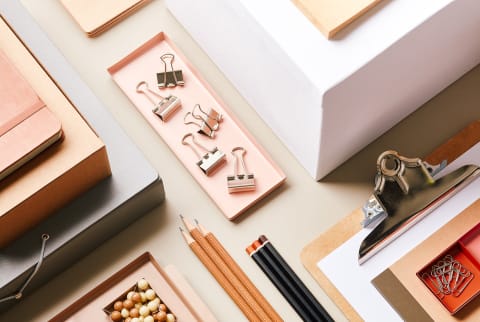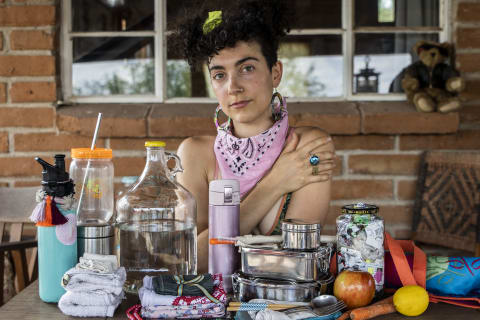Advertisement
How To Be A Minimalist When You're A Maximalist At Heart


Some like matcha; others swear by coffee. Some prefer running, others yoga. Some love simple decor; others need some tchotchkes in their life. Minimalism, like everything else, isn't right for everyone. That's why Corinne Loperfido travels the country helping people tune into their minimalist side, even if they're maximalists at heart.
Lessons learned from a year of no waste.
Loperfido wears many hats—each one of them sparklier than the last. She's a performance artist, costume designer, and event producer. There's nothing simple or understated about her. "I've always had floor-to-ceiling art hung up in my room. The minimalist aesthetic of simple, solid colors and spare objects is just not really my vibe," she tells mbg. But as her passion for sustainable causes has grown over the years, the number of her belongings has had to shrink.
One surefire way to lower environmental impact is by buying and throwing away less stuff. That's why Loperfido decided to set out on a year of no waste back in 2018. Starting on January 1, she challenged herself to not buy anything, or throw anything away, for an entire year—save for items that were necessary for survival like food and ones that would help her live a more zero-waste life, like reusable bags. Over the course of the year, she had to really tune into what was adding to her life and what was taking away from it.

"It's definitely one of the most profound and spiritual things you can do for yourself because you get really clear on what matters for you," she says. In the end, the challenge changed a whole lot more than her approach to shopping. It nudged her to rethink where she lived, the people she surrounded herself with, and how she interacted with the earth. The way she describes it, it made her "a member of a community instead of just a consumer." It showed her that while she gravitates toward certain belongings, she doesn't actually need them as much as she thought she did. In fact, she's better off without them.
A quick action plan for becoming a more minimalist consumer.
These days, Loperfido travels the country helping others adopt more mindful habits through workshops, online videos, and a soon-to-be book. "It is really urgent that we reconsider how we're using resources and living on this earth," she says. "But it needs to be fun and appealing, or people aren't going to do it."
So if taking on a year of no purchasing doesn't sound like your idea of a good time, Loperfido recommends easing into things by starting with a month of no trash. The premise is pretty simple: Hang on to anything that you would otherwise put in the garbage can (except for your food scraps, which can be composted!). Then, at the end of the month, lay everything out and sort it into piles. This will show you what categories of things you tend to accumulate the most.
"And be like, OK these are the things I consume often. How can I consume them without sending them to the landfill?" Loperfido says that this is a great way to become aware of where your pain points are, so you can better separate wants from needs. "It's about taking personal responsibility. Do I actually need this? Or is it just a Band-Aid?"
The nice thing about this technique is that it can be easily scaled (Month too long? Try a week!) and replicated whenever you feel yourself becoming overburdened by your stuff. Like actress and environmentalist Bonnie Wright's idea for a "pollution journal," where you record every time you come in contact with single-use plastic over the course of the day, it makes you aware of how pervasive waste is, so you can start to avoid it.
Loperfido's routine also reminds us that the essence of minimalism is less about maintaining a bare home and more about only bringing things into your life that actually add value to it—and don't destroy the earth in the process.
"We have so much more than we could ever need! We do not need new things," she says. "We need to be spending our resources and energy figuring out how to clean up the mess that we have made."